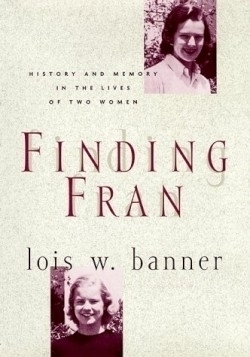Finding Fran
History and Memory in the Lives of Two Women
Finding Fran traces the lives of two women with apparently similar backgrounds who proceed to follow strikingly different paths. Author Lois W. Banner, a professor of history and gender studies is one of these women while the other is Fran Huneke, Banner’s best friend from high school, now a devout Muslim.
Banner claims such contrasting outcomes in part to sixties radicalism, but more importantly explores each woman’s childhood and family environment as the foundational component influencing the direction of their lives. Elements such as religion and adult role models take on significant consequences, especially that of the female elder. Eventually Banner identifies the separate forces which will divide their relationship. “That split between intuition and rationality contributed to the ending of Fran’s and my friendship,” as over the next several decades Fran pursues her spiritual quest and Banner pursues an academic one.
This book presents a greater understanding of these women’s present lives through a thorough examination of their pasts. The reader may not initially identify with these women’s actions, which often prioritize the men in their lives, nor with their claims to feminism that appear to contrast with their religions and lifestyles. In fact, I was disappointed with both women’s characters: Fran who continually overlooks troubling aspects of her religion, and Banner who writes and lives in a tip-toe-y manner, too concerned with coming off as offensive, and lacking a boldness in her literary voice.
In the prologue while examining Fran’s Islamic beliefs, Banner articulates the text’s perfect motto: “Although I don’t agree with her interpretation, I accept it as a viable point of view.” Similarly, though I don’t relate to these women’s life choices, I do respect them, and this is why Finding Fran is beneficial. It offers solid insight into various generations, in particular for younger women for whom it sheds light on the paths of two elders. This book would work well as part of an academic repertoire in either history or women’s studies.
Reviewed by
Kyle Norris
Disclosure: This article is not an endorsement, but a review. The publisher of this book provided free copies of the book to have their book reviewed by a professional reviewer. No fee was paid by the publisher for this review. Foreword Reviews only recommends books that we love. Foreword Magazine, Inc. is disclosing this in accordance with the Federal Trade Commission’s 16 CFR, Part 255.

